|
|
|
Sort Order |
|
|
|
Items / Page
|
|
|
|
|
|
|
| Srl | Item |
| 1 |
ID:
157283


|
|
|
|
|
| Summary/Abstract |
How should the United States approach the Korean Peninsula and the problem of North Korean nuclear proliferation? Since its initial test in October 2006, North Korea has conducted five more, increasing the estimated yield with each one.1
1. “The Missiles of North Korea,” CSIS Missile Defense Project (2017), https://missilethreat.csis.org/country/dprk/ (accessed October 20, 2017).
View all notes
Pyongyang's September 2017 nuclear test—which they claimed was a thermonuclear device—had an estimated yield of between 50–280 kilotons, a significant increase from previous tests.2
2. Michelle Ye Hee Lee, “North Korea's Nuclear Test May Have Been Twice as Strong as First Through,” The Washington Post, September 13, 2017, https://www.washingtonpost.com/world/north-korea-nuclear-test-maybe-have-been-twice-as-strong-as-first-thought/2017/09/13/19b026d8-985b-11e7-a527-3573bd073e02_story.html (accessed October 20, 2017).
View all notes
Perhaps more alarming to U.S. policymakers, the North has surged forward with its missile program, conducting 15 missile tests in 2015, 24 in 2016, and thus far 19 missile tests in the first 10 months of 2017.
|
|
|
|
|
|
|
|
|
|
|
|
|
|
|
|
| 2 |
ID:
162446


|
|
|
|
|
| Summary/Abstract |
The foreign policy behavior of North Korea remains puzzling to many observers
to date. This article aims to explain Pyongyang’s foreign behavior between 1995
and 2011 with a concept called the balance of dependence. Although it stood on
the brink of collapse in the 1990s, the North Korean regime defied the odds and
survived with the help of neighboring countries, namely South Korea, Japan, China,
Russia, and the United States. This article intends to explain Pyongyang’s foreign
policy under Kim Jong Il by focusing on how it deliberately built a portfolio of
dependence on its neighbors. I argue that North Korea’s foreign behavior had been
attuned to the rise and fall of assistance from other nations. It sought to disperse its
dependence among a host of potential sponsors in order not to be exclusively reliant
on a single donor state, fearing restrictions on its political autonomy. As long as its
neighbors are willing to help out, Pyongyang will continue to play one sponsor off
the others while making progress with its nuclear and missile programs.
|
|
|
|
|
|
|
|
|
|
|
|
|
|
|
|
| 3 |
ID:
133609
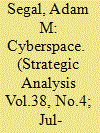

|
|
|
|
|
| Publication |
2014.
|
| Summary/Abstract |
In June 2013, President Obama met with President Xi Jinping at Sunnylands, California. The meeting was seen as a chance for the two leaders to get to know each other in a relatively informal setting so they could address the growing mistrust between their countries. While maritime disputes, trade tensions and differences over how to contain the North Korean and Iranian nuclear programmes were high on the agenda, cyber security-in particular Chinese cyber espionage-was the defining issue of this unusual summit. For the US, the meeting between the two presidents was the culmination of a long campaign to pressure Beijing to reduce the scope and scale of Chinese cyber attacks on the United States.
|
|
|
|
|
|
|
|
|
|
|
|
|
|
|
|
| 4 |
ID:
148239
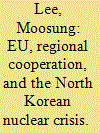

|
|
|
|
|
| Summary/Abstract |
North Korea poses a security threat by developing nuclear weapons. To address this source of regional insecurity, institutionalized frameworks of regional cooperation have been employed. Despite its usefulness as an alternative route to deal with the North Korean case, controversies still remain in terms of its relevance and effectiveness. Even so, the regional integration, consistently promoted by the EU as an integral part of its Asian policy, still requires systematic evaluation. This paper thus examines how and under which conditions regional integration can make a contribution to the transformation of the current crisis. In answering this question, it concludes that a long-term model-setting effect is hard to disregard, in spite of the mixed view of substantial compulsory and social learning effects. The underlying reasons are the ontological-seeking activities of North Korea, along with regional and global actors’ reservations about the contributions of the EU as a key security provider in Asian affairs and in its promotion of the regional integration scheme.
|
|
|
|
|
|
|
|
|
|
|
|
|
|
|
|
| 5 |
ID:
143002
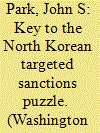

|
|
|
|
|
| Summary/Abstract |
At no point in the history of U.S. nonproliferation and counterproliferation policy have financial sanctions been so central to U.S. efforts to prevent or rollback the acquisition of nuclear weapons in countries such as North Korea and Iran. Despite this crucial role, financial sanctions have been examined almost solely from the sender's perspective, that is, the country imposing the sanctions. Few focused policy analyses have measured the effects of these instruments from the target's perspective.
|
|
|
|
|
|
|
|
|
|
|
|
|
|
|
|
| 6 |
ID:
173410


|
|
|
| 7 |
ID:
156313


|
|
|
| 8 |
ID:
092935
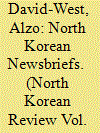

|
|
|
|
|
| Publication |
2009.
|
| Summary/Abstract |
This section contains an overview of major North Korea-related developments between December 2008 and May 2009. Newsbriefs include information on the renewed six-party talks (December), the ongoing deterioration of inter-Korean relations (January), the emergence of Kim Jong-un as a possible successor of Kim Jong-il (February), the detainment of American journalists Laura Ling and Euna Lee (March), the North Korean claim of a successful satellite launch (April), the second North Korean nuclear test and declaration of a state of war (May), and the voiding of all Kaesong Industrial Complex contracts (May). North Korean Review consulted online news media for information in this section.
|
|
|
|
|
|
|
|
|
|
|
|
|
|
|
|
| 9 |
ID:
186178
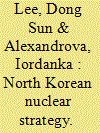

|
|
|
|
|
| Summary/Abstract |
What nuclear strategy has North Korea adopted? What factors have driven the development of this nuclear strategy? This article examines the key attributes of Pyongyang’s nuclear program to offer possible answers to these questions of scholarly and practical importance. It argues that North Korea has likely adopted an assured retaliation strategy, threatening a nuclear second strike to deter US nuclear attacks. This strategy was chosen due to its superior feasibility and desirability: it requires only a modest cost-effective nuclear arsenal, reduces Pyongyang’s security dependence on Beijing, permits politically safe centralized control over the nuclear weapons, and is also relatively economical. This article calls into question the common views that North Korea has employed a catalytic strategy using its nuclear capabilities to induce China’s assistance, and that Pyongyang is developing an asymmetric escalation strategy or a brinkmanship strategy, which utilizes nuclear weapons primarily to counter the superior conventional forces of its adversaries.
|
|
|
|
|
|
|
|
|
|
|
|
|
|
|
|
| 10 |
ID:
095998
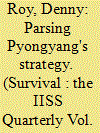

|
|
|
|
|
| Publication |
2010.
|
| Summary/Abstract |
North Korean behaviour that appears intended to raise tensions with Pyongyang's adversaries is not only vexing but puzzling. The North Koreans periodically throw up obstacles to the economic cooperation their country desperately needs, including harassment of the joint North-South industrial zone in Kaesong. Pyongyang often speaks as if it welcomes a fight with the United States and South Korea, its strongest potential adversaries. With its second nuclear test in May 2009, Pyongyang clearly angered even its important partner China, a major supplier of such basic needs as food and energy. If fear of aggression by the United States and its allies is a principal driver of North Korean foreign policy, why do the North Koreans frequently risk providing the putatively aggressive Americans further motivation to attack? Some observers argue, for example, that transfer of nuclear material or technology is extremely unlikely because Pyongyang is deterred from crossing what is clearly a red line for the United States that would bring massive military retaliation. Yet North Korean officials have more than once threatened to cross that line, seemingly for the purpose of frightening the Americans by playing on one of their worst fears.
|
|
|
|
|
|
|
|
|
|
|
|
|
|
|
|
| 11 |
ID:
142797


|
|
|
|
|
| Summary/Abstract |
The former Clinton administration official unveils progress that North Korea has made on four parallel nuclear and missile initiatives that could soon amount to a survivable, strategic nuclear capability. As a result, it is time for the United States to state unambiguously that it will impose secondary sanctions and resort to pre-emptive military action if Pyongyang performs additional nuclear or missile tests or deploys certain new and threatening military systems.
|
|
|
|
|
|
|
|
|
|
|
|
|
|
|
|
| 12 |
ID:
085914
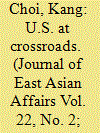

|
|
|
|
|
| Publication |
2008.
|
| Summary/Abstract |
In dealing with the challenges ahead and restoring U.S. leadership in the international community, the U.S. is expected to take different path(s) depending upon who will become the next U.S. president.
|
|
|
|
|
|
|
|
|
|
|
|
|
|
|
|
| 13 |
ID:
088918


|
|
|
|
|
| Publication |
2009.
|
| Summary/Abstract |
In May 2002, China decide not to repatriate
north
korean asylum seekers who fled to Shenyang.The decision was not only in contravention of the 1986 North Korea-China bilateral repatriation agreement, but also constituted China's repudiation of its policy denying refugee status to North Koreans in China.
|
|
|
|
|
|
|
|
|
|
|
|
|
|
|
|
| 14 |
ID:
148457


|
|
|
|
|
| Summary/Abstract |
More than two decades of nuclear dialogue between the United States and North Korea have not prevented Pyongyang from conducting four nuclear tests and building up a nuclear weapons arsenal. Putting the blame for the failure of this dialogue solely on Pyongyang ignores the hesitancy and confusion of US policy. Historical evidence suggests that the Clinton, Bush and Obama administrations consistently failed to prioritize their objectives and adopted an impatient and uncompromising negotiating strategy that contributed to this ongoing non-proliferation fiasco. Identifying US policy mistakes at important crossroads in the dialogue with Pyongyang could help to prevent similar mistakes in the future. In this regard, the following analysis suggests a new approach towards Pyongyang based on a long-term trust-building process during which North Korea would be required to cap and then gradually eliminate its nuclear weapons in return for economic assistance and normalization of relations with the United States. Importantly, the United States might have to resign itself to North Korea's keeping an independent nuclear fuel cycle under supervision of the International Atomic Energy Agency, as well as to accepting South Korea's request to independently enrich uranium and pyroprocess spent nuclear fuel. This would be a more favourable alternative to allowing North Korea to continue accumulating nuclear weapons. Moreover, if the United States continues on the Obama administration's failed policy path, then there is a better than even chance that the Korean Peninsula may slide into a nuclear arms race.
|
|
|
|
|
|
|
|
|
|
|
|
|
|
|
|
|
|
|
|
|